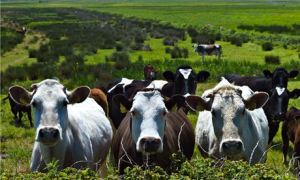 Willing to contribute to climate change mitigation? Then go on a diet. This is the advice of a group of leading scientists from the UN Economic Commission for Europe. They suggest that adopting the so-called ‘demitarian‘ diet, or in other words cutting your weekly consumption of meat and dairy products by a half, could lead to a reduction in nitrogen emissions from agriculture by as much as 40%. Needless to say, in addition to minimizing air pollution, this diet plan also reduces by almost a half the amount of saturated fats that an average person consumes, hence decreasing the risk of heart diseases and obesity.
Willing to contribute to climate change mitigation? Then go on a diet. This is the advice of a group of leading scientists from the UN Economic Commission for Europe. They suggest that adopting the so-called ‘demitarian‘ diet, or in other words cutting your weekly consumption of meat and dairy products by a half, could lead to a reduction in nitrogen emissions from agriculture by as much as 40%. Needless to say, in addition to minimizing air pollution, this diet plan also reduces by almost a half the amount of saturated fats that an average person consumes, hence decreasing the risk of heart diseases and obesity.
A while ago, an article by a team of Swedish scientists suggested that in order to combat climate change everyone should completely eliminate animal products from their food plans. Such a drastic measure, however, somehow sounds a bit too unrealistic, especially since most meat-eaters claim they have not live without their protein boost. But now, an UN report tells that it might not be necessary to go that far. Prof. Mark Sutton, one of the authors of the report, emphasizes that the problem is not that people consume the products, but rather it is the amount that needs to be controlled.
The report raises another issue, which is extremely relevant if such measures have to be implemented. Cutting down meat and dairy consumption would have a very strong impact on agriculture and farming, hence it would meet quite a big opposition. In addition, natural and semi-natural grasslands would be left unused, which will cause a whole set of new problems. But, it will also make land available for growing cereals or crops for biofuels, which could provide an alternative to farmers, who look after livestock.
Reducing greenhouse gas emissions from agriculture have been a main priority across the EU. Many countries are currently implementing policies and giving incentives to farmers in order to stimulate sustainable and environmentally friendly farming practices. As it is right now, scientists are still in the process of developing different methods to reduce the impact of emissions from agriculture. Many research programs are already in motion, and hopefully soon we will hear some clear opinions and recommendations.
Image (c) Getty Images


































Reducing livestock is a novel concept. When given that we essentially don’t need meat to survive, and given that “meat”,
as we know it, is full of chemicals (“better living through chemistry –
Arthur-Daniels-Midland, “ADM, Supermarket to the World”), good health would be
a sidebar to the overall reduction of livestock.
It’s ironic how “make(ing) land
available for growing cereals or crops for biofuels, which could provide an
alternative to farmers, who look after livestock”, sort of fits right in
with my dream of creating and refining millions of acres of veggie fuels for Domestic Dehicle Diesel Engines and EV
Engine/Motor Generators.An industry based entirely on existing
agriculture principles (planting, harvesting, replanting, refining, and
composting all while retaining some residual foods as a byproduct).
Dont go on diet! Vulvox has method of reducing rice paddy methane emissions that will make a bigger difference than cutting your meat consumption in half!
http://vulvox.tripod.com
Navigate to our methane reduction project page.